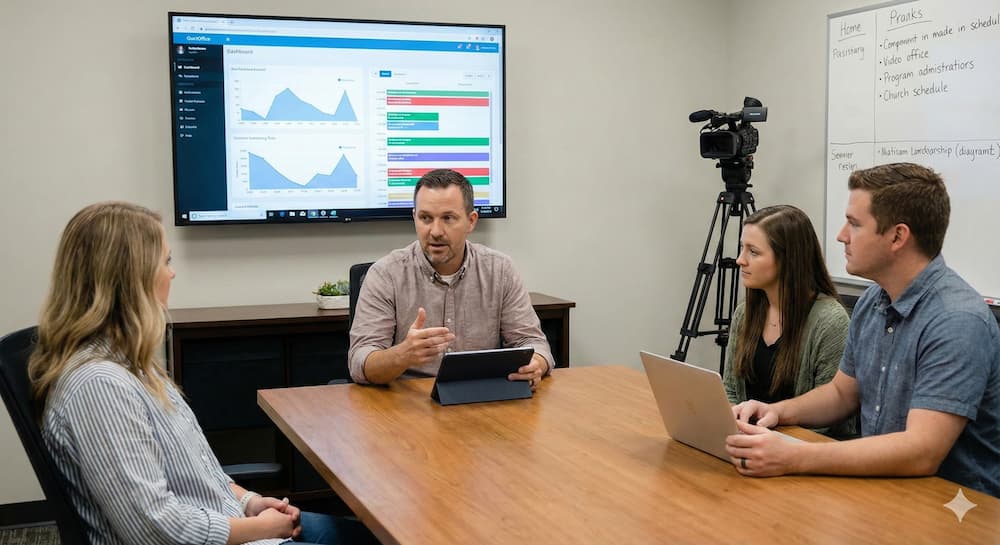4 Ways You Can Develop Leaders in Your Church

God does not call you to do everything for everyone.
Instead, God calls you to equip the members of your church to do the work of the ministry (Eph. 4:12). Your call includes encouraging and equipping people to volunteer, as well as developing leaders who can help oversee the work of the ministry.
To help you to get started, here are four ways you can develop leaders in your church.
#1. Cultivate a culture of ownership
As a pastor, one of your roles is to equip the members of your church to do the work of the ministry (Eph. 4:12). To do this, you have to lead the people you serve to see themselves as the church — individuals who are members of the body of the Christ and take responsibility for the work of the ministry.
#2. Identify potential leaders
Are there people in your church who desire to be a leader (1 Tim. 3:1)?
Do you observe people who take on leadership responsibilities without an official title?
Be observant of people in your church who either express a desire to lead or who are taking the initiative to lead. After you identify leaders, it’s essential to prayerfully consider how you can help these leaders fulfill their call.
#3. Delegate responsibility
For someone to develop his or her leadership abilities, they must have an opportunity to lead people, a project, or a program.
In general, leadership is influence. So, providing opportunities for people to influence someone or something will help him or her to develop their leadership potential.
#4. Mold leaders
Leadership is more than someone’s position. Biblically, to qualify as a leader, God requires a leader to meet specific moral and spiritual characteristics (1 Tim. 3:1–7).
To develop leaders who meet these qualifications, you must spend time with them. There is no way you can help someone fulfill their leadership potential if you are not involved in his or her life.
What would you add to this list? Share your thoughts in the comments below!
Sign Up for Product Updates
God does not call you to do everything for everyone.
Instead, God calls you to equip the members of your church to do the work of the ministry (Eph. 4:12). Your call includes encouraging and equipping people to volunteer, as well as developing leaders who can help oversee the work of the ministry.
To help you to get started, here are four ways you can develop leaders in your church.
#1. Cultivate a culture of ownership
As a pastor, one of your roles is to equip the members of your church to do the work of the ministry (Eph. 4:12). To do this, you have to lead the people you serve to see themselves as the church — individuals who are members of the body of the Christ and take responsibility for the work of the ministry.
#2. Identify potential leaders
Are there people in your church who desire to be a leader (1 Tim. 3:1)?
Do you observe people who take on leadership responsibilities without an official title?
Be observant of people in your church who either express a desire to lead or who are taking the initiative to lead. After you identify leaders, it’s essential to prayerfully consider how you can help these leaders fulfill their call.
#3. Delegate responsibility
For someone to develop his or her leadership abilities, they must have an opportunity to lead people, a project, or a program.
In general, leadership is influence. So, providing opportunities for people to influence someone or something will help him or her to develop their leadership potential.
#4. Mold leaders
Leadership is more than someone’s position. Biblically, to qualify as a leader, God requires a leader to meet specific moral and spiritual characteristics (1 Tim. 3:1–7).
To develop leaders who meet these qualifications, you must spend time with them. There is no way you can help someone fulfill their leadership potential if you are not involved in his or her life.
What would you add to this list? Share your thoughts in the comments below!
podcast transcript
God does not call you to do everything for everyone.
Instead, God calls you to equip the members of your church to do the work of the ministry (Eph. 4:12). Your call includes encouraging and equipping people to volunteer, as well as developing leaders who can help oversee the work of the ministry.
To help you to get started, here are four ways you can develop leaders in your church.
#1. Cultivate a culture of ownership
As a pastor, one of your roles is to equip the members of your church to do the work of the ministry (Eph. 4:12). To do this, you have to lead the people you serve to see themselves as the church — individuals who are members of the body of the Christ and take responsibility for the work of the ministry.
#2. Identify potential leaders
Are there people in your church who desire to be a leader (1 Tim. 3:1)?
Do you observe people who take on leadership responsibilities without an official title?
Be observant of people in your church who either express a desire to lead or who are taking the initiative to lead. After you identify leaders, it’s essential to prayerfully consider how you can help these leaders fulfill their call.
#3. Delegate responsibility
For someone to develop his or her leadership abilities, they must have an opportunity to lead people, a project, or a program.
In general, leadership is influence. So, providing opportunities for people to influence someone or something will help him or her to develop their leadership potential.
#4. Mold leaders
Leadership is more than someone’s position. Biblically, to qualify as a leader, God requires a leader to meet specific moral and spiritual characteristics (1 Tim. 3:1–7).
To develop leaders who meet these qualifications, you must spend time with them. There is no way you can help someone fulfill their leadership potential if you are not involved in his or her life.
What would you add to this list? Share your thoughts in the comments below!
VIDEO transcript
God does not call you to do everything for everyone.
Instead, God calls you to equip the members of your church to do the work of the ministry (Eph. 4:12). Your call includes encouraging and equipping people to volunteer, as well as developing leaders who can help oversee the work of the ministry.
To help you to get started, here are four ways you can develop leaders in your church.
#1. Cultivate a culture of ownership
As a pastor, one of your roles is to equip the members of your church to do the work of the ministry (Eph. 4:12). To do this, you have to lead the people you serve to see themselves as the church — individuals who are members of the body of the Christ and take responsibility for the work of the ministry.
#2. Identify potential leaders
Are there people in your church who desire to be a leader (1 Tim. 3:1)?
Do you observe people who take on leadership responsibilities without an official title?
Be observant of people in your church who either express a desire to lead or who are taking the initiative to lead. After you identify leaders, it’s essential to prayerfully consider how you can help these leaders fulfill their call.
#3. Delegate responsibility
For someone to develop his or her leadership abilities, they must have an opportunity to lead people, a project, or a program.
In general, leadership is influence. So, providing opportunities for people to influence someone or something will help him or her to develop their leadership potential.
#4. Mold leaders
Leadership is more than someone’s position. Biblically, to qualify as a leader, God requires a leader to meet specific moral and spiritual characteristics (1 Tim. 3:1–7).
To develop leaders who meet these qualifications, you must spend time with them. There is no way you can help someone fulfill their leadership potential if you are not involved in his or her life.
What would you add to this list? Share your thoughts in the comments below!















.jpg)










